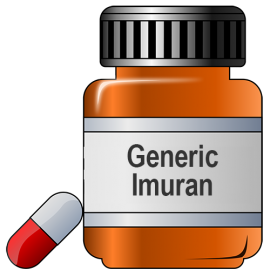Buy Imuran Online
Also known as: Azasan, Imuran
Active ingredient: Azathioprine
Product Code: PR10534
Availability:
Azathioprine is an immunosuppressant drug, belongs to purine analogue class. It is very commonly used drug in field of organ transplantation. It is an analogue of purine, which is one of the building blocks of our DNA. It is incorporated into the DNA but interferes with further elongation of the chain and thus stops DNA synthesis. In this way it stops proliferation of the rapidly dividing cells. It lowers the immunity of our body and helps prevent transplant rejection.
Indications
- · Prevention of graft rejection (as a part of combination therapy)
- · rheumatoid arthritis
- · chronic active hepatitis
- · systemic lupus erythematosus
- · ulcerative colitis, dermatomyositis
- · myasthenia gravis, periarteritis nodosa
- · pemphigus vulgaris
- · autoimmune glomerulonephritis
- · idiopathic thrombocytopenic purpura
- · psoriasis.
Contraindications
- · Hypersensitivity reaction to azathioprine as well as to mercaptopurine
- · inhibition of hematopoiesis (hypoplastic and aplastic anemia, leukopenia, lymphopenia, thrombocytopenia)
- · hepatic failure
- · pregnancy
- · breastfeeding
- · child.
Pregnancy and breast-feeding
It is contraindicated in pregnancy; it is in FDA group D category. If it is necessary to use during lactation, mother should stop breastfeeding.
Side effectsCardio-vascular system and blood (blood, hemostasis): Bone marrow suppression (leukopenia, thrombocytopenia, anemia), megaloblastic erythropoiesis and macrocytosis.
Digestive tract : Nausea, loss of appetite, vomiting, diarrhea, abdominal pain, abnormal liver function (hyperbilirubinemia, elevated liver transaminases and alkaline phosphatase ), cholestatic hepatitis, erosive and ulcerative lesions of the mouth and lips;
In transplant recipients: Pancreatitis, ulceration of the stomach and duodenum, intestinal bleeding, necrosis and perforation of the intestine
Long-term use: toxic hepatitis.
Allergic reactions: skin rash, drug fever.
Others: Myalgia, arthralgia, panuveitis, the development of secondary infections (bacterial, viral, fungal, protozoal), alopecia
In rare cases: Acute renal failure, hemolytic anemia, acute lung disease, meningeal reaction, mutagenicity (it is potentially mutagenic and causes chromosomal changes in humans), teratogenicity, carcinogenicity (may cause malignant tumors: lymphoreticular, epithelial tumors of the skin in areas exposed to sunlight).
The dose is determined individually, taking into account the type and the severity of disease. Transplantation: loading dose of 5 mg / kg in 2-3 divided doses for 1-2 months, and then at a dose of 4.1 mg / kg over a long term (several years). To remove the drug dose should be reduced gradually. If signs of graft rejection appear, raise to a dose of 4 mg / kg /day.
In other diseases: 1-2.5 mg / kg / day in divided doses, duration of treatment is determined individually.
Symptoms: diarrhea, pancytopenia, increasing the concentration of bilirubin and transaminases in blood serum.
Treatment: symptomatic, dialysis.
It should not be used long-term. During the first 8 weeks of treatment, it is recommended to weekly monitor the peripheral blood picture (and after that 1-2 times a month), as well as periodic monitoring of serum liver transaminases, alkaline phosphatase and bilirubin levels. If the kidney and/ liver function is compromised or the patient is taking allopurinol as well, azathioprine should be used in lower doses (1/4 of the average dose).
During treatment, women of childbearing age should use reliable methods of contraception.



 Support online!
Support online!
